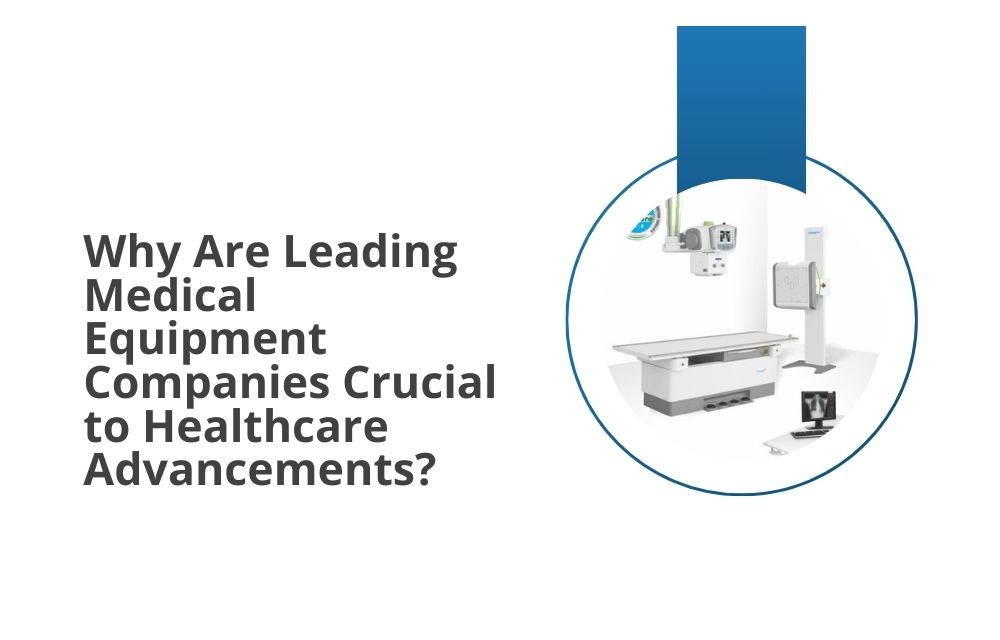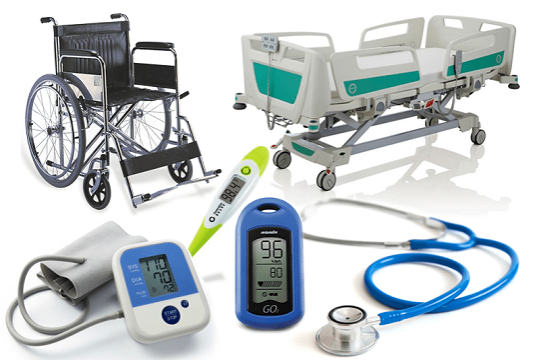
Healthcare is an ever-evolving field, with new technologies and solutions being developed to improve the quality of care and save lives. One of the key factors driving these improvements is the continuous innovation from leading medical equipment companies. These companies play a crucial role in developing new tools, technologies, and devices that help healthcare providers diagnose, treat, and monitor patients more effectively.
In this blog, we’ll explore why leading medical equipment companies are so important to healthcare advancements. We will look at how they drive innovation, improve patient care, increase efficiency in healthcare settings, and make treatments more accessible to people around the world.
The Role of Medical Equipment Companies in Healthcare Advancements
Medical equipment companies design, manufacture, and distribute the tools and technologies that healthcare providers rely on. From diagnostic machines like X-rays and MRIs to surgical robots and life-saving devices like pacemakers, these companies create the products that healthcare professionals use every day to save lives and improve patient outcomes.
1. Driving Innovation in Medical Devices
The most significant contribution of leading medical equipment companies is their ability to innovate. They continuously develop new and improved devices that help diagnose diseases more accurately, treat conditions more effectively, and monitor patient health more closely.
For example, the development of imaging technologies such as CT scans and MRIs has revolutionized the way doctors detect and diagnose diseases. These machines provide detailed images of the inside of the body, allowing healthcare providers to detect conditions like cancer, heart disease, and neurological disorders in their early stages. Without these tools, many conditions would remain undiagnosed until they reached later, more difficult-to-treat stages.
Medical equipment companies also play a role in advancing surgical techniques. Robotic surgery systems, for instance, have transformed the way complex surgeries are performed. Surgeons can now perform procedures with greater precision and minimal invasiveness, reducing recovery times for patients and lowering the risk of complications.
2. Enhancing Patient Care
Leading medical equipment companies are always focused on improving patient care. Whether it’s through creating devices that make treatment more comfortable, safer, or more effective, these companies are working to make healthcare better for everyone.
Take, for example, wearable health devices such as fitness trackers, glucose monitors, and heart rate monitors. These devices allow patients to track their own health in real-time, which is especially beneficial for individuals managing chronic conditions like diabetes or heart disease. By providing continuous data to both patients and doctors, these devices help prevent complications and ensure that people receive the right care at the right time.
In addition, many medical equipment companies are developing devices that are less invasive and more patient-friendly. For instance, non-invasive blood glucose monitoring systems allow diabetics to check their blood sugar levels without the need for painful finger pricks. Similarly, advancements in diagnostic testing have led to quicker, less painful procedures that improve the overall patient experience.
3. Improving Diagnosis and Early Detection
One of the most significant ways that medical equipment companies contribute to healthcare advancements is by improving the accuracy of diagnoses. Early detection of diseases like cancer, heart disease, and neurological disorders is essential to successful treatment. The technology developed by medical equipment companies plays a vital role in detecting these conditions in their early stages, often before symptoms even appear.
For example, mammograms and other imaging technologies can detect breast cancer before it spreads, giving patients the best chance at survival. Likewise, advanced blood tests and genetic screenings are helping doctors detect diseases like diabetes, heart disease, and certain cancers much earlier than before.
Furthermore, diagnostic tools powered by artificial intelligence (AI) are allowing healthcare providers to detect conditions with greater accuracy. AI algorithms can analyze medical images, lab results, and patient data to assist doctors in diagnosing diseases like cancer or heart conditions more effectively. With these tools, medical equipment companies are not only improving the precision of diagnoses but also helping to reduce human error in the process.
Making Healthcare More Accessible
Leading medical equipment companies are also making healthcare more accessible, especially in underserved and remote areas. In many parts of the world, access to advanced medical technologies is limited, and people in rural or low-income areas may not have the same healthcare opportunities as those in urban centers. However, medical equipment companies are working to bridge this gap by developing affordable, portable, and easy-to-use devices that can be used in any setting.
1. Affordable Healthcare Solutions
One of the challenges in global healthcare is ensuring that medical equipment is available to people regardless of their location or financial situation. Leading companies are addressing this by developing cost-effective medical solutions. These include low-cost diagnostic tools, portable medical devices, and affordable treatment options that can be used in a variety of settings.
For example, mobile health clinics that use portable diagnostic equipment are helping to bring healthcare to remote regions where hospitals and clinics are scarce. These portable devices allow healthcare providers to perform tests, make diagnoses, and provide treatment without the need for expensive infrastructure.
In addition, companies are working to reduce the cost of high-end medical equipment, making it more accessible to smaller hospitals, clinics, and healthcare providers in developing countries. By doing so, they help ensure that people in underdeveloped or rural areas can access the care they need without traveling long distances or incurring large expenses.
2. Telemedicine and Remote Monitoring
Telemedicine has been a game-changer in improving access to healthcare, especially during the COVID-19 pandemic. Medical equipment companies are developing telemedicine technologies that allow healthcare providers to offer consultations, diagnoses, and treatments remotely. With telemedicine, patients no longer need to visit a hospital or clinic in person, which is especially helpful for those in remote areas or those with mobility issues.
Remote monitoring devices, such as wearable health trackers or home blood pressure monitors, also play a key role in improving access to care. These devices allow patients to manage their conditions from home, without needing to visit a healthcare facility regularly. By transmitting health data to doctors and nurses in real time, these devices enable healthcare providers to monitor patients’ conditions and adjust treatments as necessary, all from a distance.
The Future of Healthcare: Data, AI, and Robotics
The future of healthcare is being shaped by the continued advancements in medical equipment and technology. Leading medical equipment companies are not only improving existing devices but also developing new technologies that are transforming the way healthcare is delivered.
1. Artificial Intelligence and Machine Learning
AI is revolutionizing the healthcare industry, and medical equipment companies are at the forefront of this change. AI algorithms can process vast amounts of patient data and provide doctors with insights that help them make better decisions. From analyzing medical images to predicting patient outcomes, AI is making healthcare more accurate and efficient.
For example, AI-powered imaging tools can help detect conditions like cancer or heart disease with greater precision. Similarly, AI can analyze a patient’s medical history, lab results, and symptoms to predict future health risks, enabling doctors to intervene before a condition worsens.
In the future, AI will continue to play a significant role in medical equipment innovation. Companies are already developing AI systems that can perform tasks like robotic surgery, drug discovery, and personalized treatment planning, all of which will make healthcare more effective and efficient.

2. Robotics in Surgery and Rehabilitation
Robotics is another area where medical equipment companies are making a big impact. Surgical robots are becoming more advanced, allowing surgeons to perform minimally invasive procedures with greater accuracy and less risk. These robots are controlled by surgeons using highly precise instruments, allowing for smaller incisions, faster recovery times, and fewer complications.
In addition to surgery, robotics is also being used in rehabilitation. Robotic exoskeletons are helping patients with mobility impairments regain the ability to walk, and robotic physical therapy devices are assisting with muscle recovery after injuries or surgeries.
3. Personalized Medicine
The future of healthcare is moving toward personalized medicine, where treatments are tailored to each individual’s specific needs. Medical equipment companies are working on developing diagnostic tools and devices that can identify patients’ unique genetic makeup, allowing for more personalized treatment plans.
For example, genetic testing devices can now help doctors identify which medications will work best for a patient based on their genetic profile, reducing the trial-and-error approach that has traditionally been used in prescribing medication.
Conclusion
Leading medical equipment companies are at the heart of healthcare advancements. Their innovations improve the accuracy of diagnoses, the effectiveness of treatments, and the accessibility of healthcare. From wearable devices and AI-powered diagnostic tools to robotic surgery systems and affordable medical solutions, these companies are driving the future of healthcare.
Their work not only improves the lives of individual patients but also makes healthcare more efficient, affordable, and accessible to people around the world. As technology continues to advance, we can expect these companies to continue to shape the future of medicine, making healthcare better for everyone.
Note:- To read more articles visit on ideaepic.





Leave a Reply